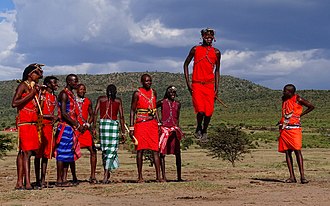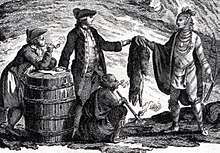Traditional society

Traditional (or traditional) society (obsolete premodern society ) is ...
- a designation of older sociological theories for a form of society that is seen as the forerunner of modern or modernized society. Assuming that societies develop further ( socio-cultural evolution ), traditional society describes the stage of a society before or from which a modern society is formed (see also the terms modern and premodern ). Correspondingly, traditional societies can be clearly distinguished in various aspects - for example from modern industrial societies - but they mostly have similarities with one another.
- a term in recent literature that is used as a synonym for the derogatory term natural people . The ethnologist Klaus E. Müller provides the following definition:
“The term is understood to mean [...] camp and village communities in wild and armed forces , agrarian and nomadic pastoral cultures, which at the time of their research had little or no contact with modern industrial civilizations . Your life was strictly within the ancestral traditions (hence the term "traditional society") that by the example of our ancestors ( ancestors ) sanctified and were sanctioned by the creation and therefore were considered untouchable. "
Cultural change
Today, traditional society is no longer viewed as a lower stage of development, but as an independent cultural reaction to the respective living conditions. As soon as traditional societies are confronted with a modernized culture, a cultural change is initiated in an entirely new direction. If the contact is permanent and intensive, acculturation (adaptation process) occurs. The mostly enormous cultural distance to the “hot, progressive believing, civilized” societies , which in most cases are perceived as extremely powerful and dominant, leads to an increasing assimilation towards the abandonment of traditions ; even if there is no repression or aggressive transculturation by the new rulers. Such accelerated change usually creates a traumatic culture shock in the “cold, conservative, value conservative” societies with far-reaching negative consequences:
- declining ethnicity and increasing identification with modern culture
- often social “uprooting” and marginalized lifestyle
- Traditional economic methods are losing their existential importance
- Self-contained subsistence is more and more addictive market economy replaced
- Traditional knowledge , mother tongue, myths , rites and customs are increasingly disappearing
If people succeed in incorporating new cultural elements profitably and harmoniously into their traditions and finding their own, accepted way of modernization that does not damage the traditional structures and preserves ethnic identity , one speaks of indigenization . Former “primitive peoples” , who have already largely been assimilated, sometimes reactivate old traditions. If this happens by necessity (for example through the return to subsistence farming due to a lack of alternatives, such as with the reindeer herders in Siberia or some Australian Aborigines), this is referred to as retraditionalization . Targeted, organized revival of traditions in a new direction and form, which on the one hand is compatible with the modern world and on the other hand enhances certain areas of the former way of life and identity , is called re-indigenization .
Modernization theories
Until the second third of the 20th century, the term traditional society belonged in the context of differentiation and modernization theories . They looked at what changes industrialization - in particular the change in the mode of production towards the division of labor - has or had on society.
Two-phase models
- Talcott Parsons
The scheme of pattern variables of Talcott Parsons provides several indicators opposite of traditional society and modern society.
- Emile Durkheim
Émile Durkheim differentiates the various societies according to mechanical and organic solidarity .
- Ferdinand Tönnies
Ferdinand Tönnies , in his work Geist der Neuzeit (1935), described the path from traditional medieval to modern society as the mental path from a predominantly “communal” to a predominantly “social” culture (cf. Community and Society ).
- Henry Sumner Maine
Henry Sumner Maine speaks of the development from status to contract .
Multi-phase models
- Walt Whitman Rostov
In 1960, the American economist Walt Whitman Rostow (1916–2003) distinguished the following social stages in his stage theory :
- traditional society
- Creation of the prerequisites for economic advancement
- economic rise
- Development to maturity
- Age of mass consumption
For the post-consumer era, Rostov envisioned a “better, more ideal” society.
- Marxism
Also of historical materialism (Marxism) is based on an overall development of the society from a primitive state to the final state of communism:
Legal recognition
In Brazil , "traditional peoples and communities" have been legally recognized since Decree 6040 of February 7, 2007. This makes Brazil the first state of traditional communities to be declared a legal subject. This legal recognition was preceded by the political struggle of the internationally known activist and rubber tapper Chico Mendes . Even before the decree, indigenous peoples and quilombolas had special rights that were laid down in the constitution.
See also
literature
- Anthony Giddens : Tradition in Post-Traditional Society. In: social world. 1993, pp. 445-485, ISSN 0038-6073 .
- Jürgen Habermas : Structural Change in the Public . Volume 4, Luchterhand, 1965.
- Gerhard Preyer : On the topicality of Shmuel N. Eisenstadt: Introduction to his work. Springer, Wiesbaden 2011, ISBN 978-3-531-16458-8 .
Individual evidence
- ^ Johannes Angermüller: Macrosociology after the modern age. From society to the social. In: Berliner Debatte Initial. 22 (4): pp. 12-25. doc version on www.johannes-angermuller.net p. 6.
- ↑ Klaus E. Müller: Shamanism. Healers, spirits, rituals. 4th edition, CH Beck, Munich 2010 (original edition 1997), ISBN 978-3-406-41872-3 . P. 11.
- ↑ Heiko Schrader: Development Sociology - A Definition of Terms. Otto von Guericke University, Magdeburg 2008. ISSN 1615-8229 . P. 5.
- ^ Bettina Eckl and David Prüm: Introduction to Developing Countries Studies, Part III: Development Strategies. Chapter 31: Development Theories. University of the Media , Stuttgart 1998/99.
- ^ Walter Hirschberg (founder), Wolfgang Müller (editor): Dictionary of Ethnology. New edition, 2nd edition, Reimer, Berlin 2005. p. 34.
- ↑ Raul Páramo-Orgega: The trauma that unites us. Thoughts on the Conquista and Latin American identity. In: Psychoanalysis - Texts on Social Research. 8th year, issue 2, Leipzig 2004, pp. 89–113.
- ↑ Dieter Gawora: Strategic Groups for Sustainable Development In: Brasilicum 238/239, Freiburg 2015, ISSN 2199-7594 pp. 4–7.
